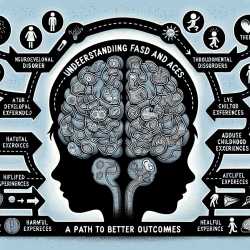Introduction
As practitioners dedicated to enhancing the lives of children with developmental challenges, it is crucial to stay informed about the latest genetic research that could impact therapeutic approaches. A recent study titled "Identification of a Hemizygous Novel Splicing Variant in ATRX Gene: A Case Report and Literature Review" provides valuable insights into the genetic underpinnings of intellectual disability-hypotonic facies syndrome, X-linked, 1 (MRXHF1). This blog will explore how these findings can be applied in practice to improve outcomes for affected children.
Understanding the Case Study
The study focuses on a 3-year-old boy with significant developmental delays, intellectual disability, and distinct craniofacial features. Genetic testing revealed a novel hemizygous intronic variant in the ATRX gene, which led to exon 24 skipping. This genetic anomaly is linked to the child's clinical presentation, providing a clearer understanding of the condition's etiology.
Implications for Practice
For practitioners, the identification of this ATRX variant underscores the importance of genetic testing in cases of unexplained developmental delays. Here are some key takeaways for implementing these findings in practice:
- Genetic Counseling: Encourage families to pursue genetic testing when developmental milestones are not met. Understanding the genetic basis can guide therapeutic decisions and provide families with crucial information for future planning.
- Personalized Therapy Plans: Recognize that genetic variants can influence the effectiveness of therapeutic interventions. Tailor speech and physical therapy programs to address the specific needs of children with ATRX-related conditions.
- Interdisciplinary Collaboration: Work closely with geneticists and other healthcare professionals to create a comprehensive care plan that addresses both the genetic and developmental aspects of the child's condition.
Encouraging Further Research
While this case study provides valuable insights, it also highlights the need for further research into the ATRX gene and its variants. Practitioners can contribute to this growing body of knowledge by documenting clinical observations and outcomes related to genetic testing and therapy.
Conclusion
By integrating genetic insights into practice, practitioners can enhance the quality of care for children with developmental challenges. The identification of novel genetic variants not only aids in diagnosis but also informs personalized therapeutic strategies that can significantly improve outcomes.
To read the original research paper, please follow this link: Identification of a Hemizygous Novel Splicing Variant in ATRX Gene: A Case Report and Literature Review.










